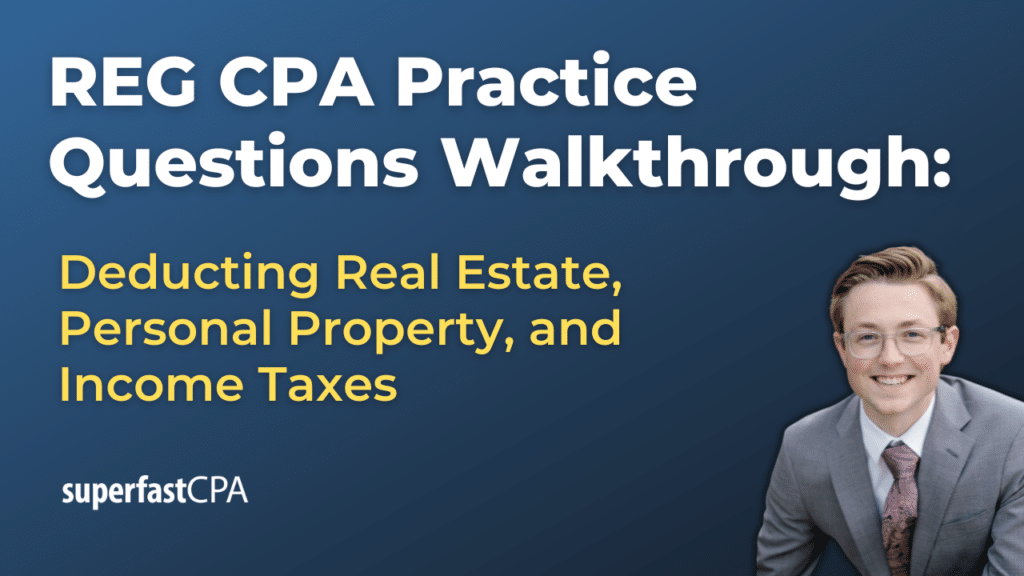In this video, we walk through 5 REG practice questions demonstrating how to deduct real estate and other taxes, including personal property and income taxes. These questions are from REG content area 4 on the AICPA CPA exam blueprints: Federal Taxation of Individuals.
The best way to use this video is to pause each time we get to a new question in the video, and then make your own attempt at the question before watching us go through it.
Also be sure to watch one of our free webinars on the 6 “key ingredients” to an extremely effective & efficient CPA study process here…
How to Deduct Real Estate and Other Taxes
Here’s a detailed overview of how taxes are deductible on an individual’s tax return.
State and Local Taxes (SALT)
Income Taxes or Sales Taxes
- Option to Deduct: Taxpayers have the choice to deduct either state and local income taxes paid or state and local sales taxes paid during the year, but not both.
- Who Benefits: This choice benefits taxpayers in states with no income tax or those who made significant purchases during the year.
Property Taxes
- Deductible Taxes: Property taxes on real estate you own that are based on the assessed value of the property and charged on a uniform basis can be deducted.
- Non-Deductible Fees: Many local benefits taxes or assessments for improvements that increase the value of your property (e.g., sidewalks, sewer lines) are not deductible.
Personal Property Taxes
- Criteria for Deduction: Taxes on personal property, such as vehicles, can be deducted if they are assessed annually and based on the property’s value.
Limitations
- SALT Deduction Cap: The total amount you can deduct for state and local taxes (including income or sales taxes and property taxes) is capped at $10,000 ($5,000 if married filing separately).
- Alternative Minimum Tax (AMT): Deductions for taxes, among other items, may trigger the AMT for some taxpayers, limiting the tax benefit.
Deductibility on Different Tax Schedules
- Schedule A (Itemized Deductions): Most tax deductions, including state and local taxes, are claimed here. Taxpayers must decide whether itemizing or taking the standard deduction offers the best tax benefit.
- Schedule C and E: Business owners and landlords can deduct state and local taxes directly related to their business or rental properties on these schedules, outside the limitations of Schedule A.
Example:
Olivia is a single taxpayer living in a state with both income and sales taxes. She owns a home, a car, and works as a freelance graphic designer. During the tax year, Olivia faces the following financial situation relevant to her tax deductions:
- State Income Taxes Paid: $4,800
- General Sales Taxes Paid: Estimated at $2,500
- Additional Sales Tax from Major Purchases: $1,200
- Property Taxes Paid on Home: $3,600
- Vehicle Registration Fee Based on Value: $400
Olivia is trying to determine the best way to maximize her deductions related to taxes paid.
Analysis and Strategy
- SALT Deduction Cap: The first limitation Olivia encounters is the $10,000 cap on SALT deductions. This cap includes state and local income or sales taxes plus property taxes.
- Choosing Between Income and Sales Taxes:
- With the additional $1,200 in sales taxes from major purchases, her total sales tax deduction would be $3,700.
- Olivia decides to deduct income taxes instead of sales taxes because they are greater, even with the additional sales tax from major purchases.
- Total Deductible Taxes:
- State Income Taxes: $4,800
- Property Taxes: $3,600
- The total is $8,400, which is under the $10,000 SALT deduction cap.
- Vehicle Registration Fee: Since the fee is based on the vehicle’s value and assessed annually, it qualifies as a personal property tax. This adds $400 to her deductible taxes, for a total of $8,800.













